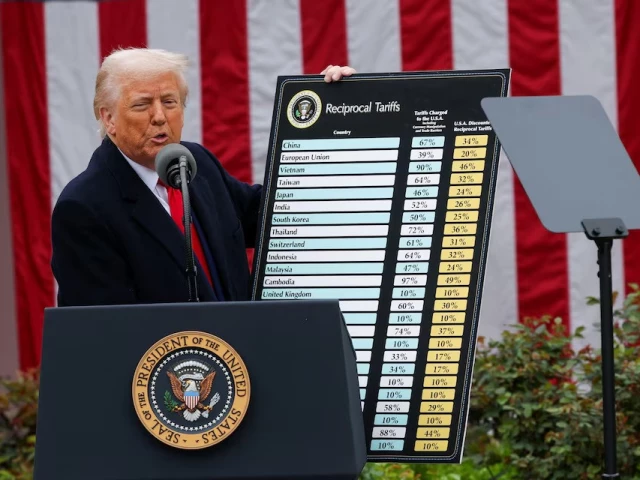Trump's reciprocal tariffs shake global economy
Experts say tariffs violate international trade rules, predict increasing role for US in global value chains

By announcing reciprocal tariffs, US President Donald Trump has effectively dropped a nuclear bomb on the global financial architecture (GFA), escalating the trade war, slowing US economic growth, and driving up prices for Americans. Moreover, numerous countries worldwide now face the risk of recession.
According to Al Jazeera, Trump has introduced a range of reciprocal tariffs targeting almost all US trading partners, dismantling Washington's long-standing advocacy for free trade and globalisation. These tariffs also impact economies already struggling with financial stability and dependent on International Monetary Fund (IMF) loans, such as Sri Lanka and Pakistan. In response, global stock markets have plummeted, with investors shifting towards gold and other safe-haven assets.
This is a major development that has further intensified the trade war, altering global trade patterns by imposing taxes on goods shipped to the United States. Countries from Nicaragua to Cambodia, particularly in the Global South, are already feeling the heat of Trump's sweeping global tariffs. The market shock has severely affected Southeast Asian economies, including China (54%) and Vietnam (45-46%), among others.
Within minutes of Trump's announcement, an international backlash erupted, with world leaders condemning the tariffs as unjustified. Interestingly, Trump's sweeping tariffs even extend to the remote Heard and McDonald Islands, which have no human inhabitants but are home to seals and penguinsan ironic reflection of the US administration's so-called economic, trade, and revenue justifications. Despite having no apparent exports or imports, these sub-Antarctic islands, an external territory of Australia, will still be subject to a 10% tariff.
Trump's thundering tariffs have serious socio-economic, geopolitical, and geostrategic consequences. This is not a so-called "liberation day" for the US economy but rather a doomsday scenario for its industries, trade partnerships, manufacturing capacity, and common citizens. The policy is expected to backfire, causing severe harm to American manufacturers, workers, families, and exporters. The longer the tariffs remain in place, the greater the collateral damage to the US economy, especially if trading partners impose retaliatory measures. As a result, the global economy will suffer immensely, triggering greater uncertainty and escalating protectionist policies. The unified response from US allies, labelling the tariffs as "extremely regrettable," highlights the growing anti-US sentiment worldwide.
Economic strategist and regional expert Dr Mehmoodul Hassan Khan stated that there are no winners in a trade war, and protectionism leads nowhere. He reiterated that China has urged the US to immediately remove unilateral tariffs and resolve trade disputes through dialogue. According to Khan, the US tariffs are based on unilateral and subjective assessments, violating international trade rules and severely undermining the legitimate rights and interests of affected countries. He described them as a typical act of unilateral bullying, revealing the US administration's economic whims that erode the international trading system and economy alike.
Khan further noted that Trump's tariffs are aggressive and extensive. The new duties will impact trillions of dollars in trade, likely raising prices in the US on consumer goods such as clothing, European wine, bicycles, toys, and thousands of other goods, ultimately burdening the average American. Poverty is expected to increase, unemployment will widen, and social inequalities in the US will worsen. The tariffs are more severe than investors' anticipated worst-case scenarios. The new import taxes will fuel economic uncertainty, leading to dire consequences for millions worldwide.
According to Xinhua, China has urged the United States to correct its wrongful imposition of "reciprocal tariffs" and address trade disputes through equal, respectful, and mutually beneficial negotiations. Chinese Foreign Ministry spokesperson Guo Jiakun stated on Thursday that under the pretext of "reciprocity," the US has imposed additional tariffs on exports from China and other countries, which seriously violate World Trade Organisation (WTO) regulations and undermine the rules-based multilateral trading system. "The Chinese side firmly opposes this and will take necessary measures to resolutely safeguard its legitimate rights and interests," Guo said, reiterating that there are no winners in a trade or tariff war and that protectionism offers no solution.
International trade and economy expert Dr Aadil Nakhoda said that these tariffs disrupt the global trading system, as the most efficient producers of goods, particularly East Asian countries, now face increasing restrictions on exports to the US.
He explained, "Two major shifts will occur. In the short term, exports will contract as alternative markets are sought. However, the structure of these tariffs suggests an increasing role for the US in global value chains. More inputs will likely be sourced from the US to help narrow the trade deficit."
Nakhoda advised Pakistani textile exporters to integrate their production networks with the US, particularly by importing raw cotton and cotton yarn. Additionally, he stressed the importance of expanding exports to the European Union and other markets to prevent production costs for US-bound exports from skyrocketing. "Productive efficiency will become more critical than ever," he added.






















COMMENTS
Comments are moderated and generally will be posted if they are on-topic and not abusive.
For more information, please see our Comments FAQ